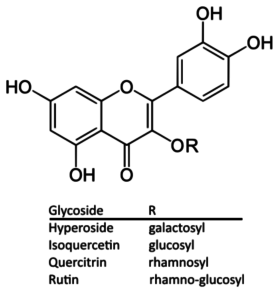Is the capacity of the gut to break down and absorb plant bioactives different in older people compared to younger people?
by Emilie Combet, Senior Lecturer in Nutrition, and Christine Edwards, Professor of Nutritional Physiology
Polyphenolics are small compounds found in most plant foods – they are classified as “bioactives” because research shows that they can impact on health when ingested. In a recently published study, we have compared the ability of a group of younger and older adults to metabolise these compounds.
Older and younger people do not metabolise plant bioactives the same way
This is part of our work on what is known as the inter-individual variability in the response to plant bioactives – which is also the theme of the COST Action POSITIVe that we are contributing to. We know that a diet rich in plant bioactives sustains health, but we also now understand that there is a lot of variation in our ability to handle these compounds. The differences in how our guts break down these compounds in plant foods may affect how much they improve our health. Research in this area will enable us, in the future, to “tailor” dietary recommendations.
Quantity of phenolic acids excreted are similar, but quality/diversity differ between younger and older study participants
We study small molecules, the phenolic acids, which are made by our gut bacteria and excreted in urine after a meal rich in complex molecules from plant foods: the polyphenols (including rutin). For the first time, we demonstrated that both old and young adults, given a diet rich in polyphenols, excrete similar total amounts of phenolic acids in their urine. However, a closer look tells us that excretion in the older adults is much less consistent than the younger group. While all younger adults excrete 17 phenolic acids, the older adults excrete a much narrower range. As these phenolic acids may vary in their action in the body, this may determine what health benefits are achieved.
Feeding diets rich and low in polyphenolics to understand their metabolism

Practically, we are again indebted to our amazing study participants, without whom this important research would not be possible. The participants in this study followed two special diets – one low in polyphenolics, the other high. They recorded their diet, collected urine samples, as well as faecal samples. We used an analytical platform using mass spectrometry to identify the phenolic acids in the urine of all participants, after each diet, and used the faecal samples in our in vitro model of the gut, to understand whether the microbiota of each participant was able to break down polyphenols.
Behind the curtain:
This type of research study typically generate thousands of samples to analyse – in this project, the machines were running day and nights continuously for weeks.

Our findings matter for the ageing population, policy, and key stakeholders in the food sector
This piece of the puzzle fits snuggly into the body of evidence that we are contributing to – it shows that research studies should consider carefully how they select their participants, and report on outcomes. It also moves us a step closer to dietary recommendations that take in consideration the variability in the human response to diets. This is relevant to consumers and the ageing population, healthcare professionals and food industry partners alike.
Further reading
Alkhaldy, A., Edwards, C.A. and Combet, E. (2018) The urinary phenolic acid profile varies between younger and older adults after a polyphenol-rich meal despite limited differences in in-vitro colonic catabolism. European Journal of Nutrition – https://doi.org/10.1007/s00394-018-1625-1
Menezes, R. et al. (2017) Impact of flavonols on cardiometabolic biomarkers: a meta‐analysis of randomized controlled human trials to explore the role of inter‐individual variability. Nutrients, 9(2), 117. (doi:10.3390/nu9020117) (PMID:28208791)
Who are the researchers
Areej Alkhaldy was the lead researcher on this study, which contributed to her PhD thesis, supervised by Dr Emilie Combet and Prof Christine Edwards. Areej is now an assistant professor in the Department of Clinical Nutrition at King Abdulaziz University in Saudi Arabia – she remains in regular contact with the Glasgow team



